| Srl | Item |
| 1 |
ID:
128693
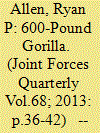

|
|
|
| 2 |
ID:
044809


|
|
|
|
|
| Publication |
London, Frances Pinter (Publishers) limited, 1983.
|
| Description |
xviii, 457p.hbk
|
| Series |
CSIS Publication Series on the Soviet Union in the 1980s
|
| Standard Number |
0861873386
|
|
|
|
|
|
|
|
|
|
|
|
Copies: C:1/I:0,R:0,Q:0
Circulation
| Accession# | Call# | Current Location | Status | Policy | Location |
| 030827 | 947.0853/BYR 030827 | Main | On Shelf | General | |
|
|
|
|
| 3 |
ID:
138723
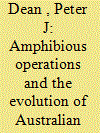

|
|
|
|
|
| Summary/Abstract |
Since its European settlement in 1788, Australia has been dependent on great-power protectors for its security. Initially this security was achieved by virtue of Australia’s status as a British colony, later as a member of the British Commonwealth. In return for its protection, Australia committed military forces in support of British interests to the Sudan, in the Boer War, and in the First and Second World Wars. Australian support for these actions was premised on two key factors: Australia’s membership in the Empire (and with that the identity of its citizens as “independent Australian-Britons”) and the assessment, universal among Australians, that support and protection of the Empire and of British interests were also in their interest
|
|
|
|
|
|
|
|
|
|
|
|
|
|
|
|
| 4 |
ID:
176262
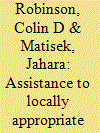

|
|
|
|
|
| Summary/Abstract |
For decades, military assistance in southern Somalia focused on building up a central state army. This reflects standard patterns of Western assistance worldwide. Yet the nature of Somali society and clan, greatly affected by the winnowing process of more than 30 years of conflict, means that most sub-clan groupings are more militarily effective than centralised forces deployed to unfamiliar areas. The centralised Somali National Army remains riven by clan itself, thoroughly politicised, and ineffective (with the exception of the Danab special forces). Based on fieldwork and interviews with military personnel who work in Somalia, Colin D Robinson and Jahara Matisek argue that these locally appropriate forces deserve assistance, albeit with some caveats, in the continuing struggle against Al-Shabaab.
|
|
|
|
|
|
|
|
|
|
|
|
|
|
|
|
| 5 |
ID:
121818
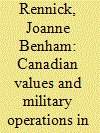

|
|
|
|
|
| Publication |
2013.
|
| Summary/Abstract |
Whereas traditionally religion has played a central role in shaping the shared values in a society, secularization, privatization of religion, and pluralism are changing the values that personnel bring to the Canadian Forces. This late modern reality means that many people who have rejected traditional forms of religion in order to interpret their personal spiritual beliefs for themselves are uncertain about their core values. Differences in values among military personnel are further complicated by the realities of modern military engagements that require a greater need for ethical thinking and moral decision making. This article examines the nature of religion and values in late modern Canadian society and identifies religious leadership as a source of moral and ethical direction as well as consolation in the face of moral anomie. Finally, it highlights the need for greater education about the role of religion and values for military personnel.
|
|
|
|
|
|
|
|
|
|
|
|
|
|
|
|
| 6 |
ID:
102874


|
|
|
| 7 |
ID:
101329
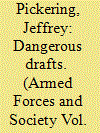

|
|
|
|
|
| Publication |
2011.
|
| Summary/Abstract |
Conscription has been claimed to both increase leaders' propensity to use military force abroad and constrain them from doing so. The author sheds new light on this longstanding controversy by presenting the first time-series, cross-national quantitative analysis of the impact that state military manpower systems (either conscription or volunteerism) have on the initiation of both traditional, belligerent military missions and "operations other than war" (OOTWs). Using negative binomial regression on 166 states from 1946 to 2001, the author finds that states with conscript militaries have a significantly higher propensity to use belligerent military force than states with volunteer armies. Countries that practice conscription are also more likely than countries with volunteer forces to launch a specific type of OOTW, military operations against nonstate actors such as rebels or terrorists. Neither form of military manpower system seems, however, to be significantly related to the initiation of humanitarian military operations.
|
|
|
|
|
|
|
|
|
|
|
|
|
|
|
|
| 8 |
ID:
128780
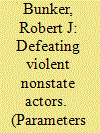

|
|
|
|
|
| Publication |
2013-14.
|
| Summary/Abstract |
The role of landpower "at war" is as integral to US defense need as land power "short of war: but what about the role of landpower between these two in environment in which violent nonstate actors as quickly as possible so policing forces can implement follow-on strategies. Landpower can help provide security condition under which these strategies can be facilitated.
|
|
|
|
|
|
|
|
|
|
|
|
|
|
|
|
| 9 |
ID:
130304
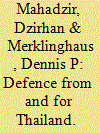

|
|
|
|
|
| Publication |
2013.
|
| Summary/Abstract |
The article reports on developments in Thailand's military forces. It mentions its renewed focus on international security and border protection through military procurement projects and purchase of new equipment under its new Prime Minister Yingluck Shinawatra. It notes the 10 year procurement plan of its Ministry of Defense (MoD) which involves the growth and fortification of its armed forces. An overview of its growing defence budget is also presented.
|
|
|
|
|
|
|
|
|
|
|
|
|
|
|
|
| 10 |
ID:
089289
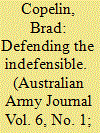

|
|
|
| 11 |
ID:
096565
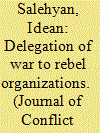

|
|
|
|
|
| Publication |
2010.
|
| Summary/Abstract |
States in an international dispute sometimes choose to attack their enemies with their own military forces but other times choose to empower domestic insurgent groups. What explains the decision to act through rebel proxies rather than directly engage a rival? Theories and empirical analyses of international conflict have adopted a state-centric bias, ignoring the substitution between direct uses of force and indirect action through rebel organizations. This note examines the decision to delegate conflict to rebels through the lens of principal-agent theory. While states support rebel groups to forgo some of the costs of conflict, they also lose a degree of foreign policy autonomy. Preliminary evidence of conflict delegation is presented, along with a number of empirically testable propositions. Finally, the consequences of delegation from the rebels' perspective are explored. This framework serves as a starting point for future research on rebel-patron interactions.
|
|
|
|
|
|
|
|
|
|
|
|
|
|
|
|
| 12 |
ID:
079079
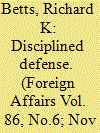

|
|
|
|
|
| Publication |
2007.
|
| Summary/Abstract |
The United States now spends almost as much on defense in real dollars as it ever has before -- even though it has no plausible rationale for using most of its impressive military forces. Why? Because without political incentives for restraint, policymakers have lost the ability to think clearly about defense policy. Washington's new mantra should be "Half a trillion dollars is more than enough
|
|
|
|
|
|
|
|
|
|
|
|
|
|
|
|
| 13 |
ID:
175015
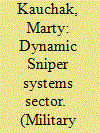

|
|
|
| 14 |
ID:
131050
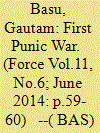

|
|
|
|
|
| Publication |
2014.
|
| Summary/Abstract |
The two leading Mediterranean powers in the post-Greek world clashed in three Punic Wars in the first of which Rome, now master of all Italy, overran Sicily, reinvented itself as a naval power and took its armies beyond Europe for the first time to Carthage in Africa
By the mid-3rd century BC, Romans had secured the whole of the Italian peninsula defeating in about 100 years every rival on mainland Italy. First the Latin League dissolved in the Latin War, then the Samnites were subjugated in three Samnite wars, and finally the cities of Magna Grecia submitted to Rome after Pyrrhus of Epirus withdrew (see FORCE May 2014). Barely decades after the last Pyrrhic War, Rome fought outside Italy for the first time. The First Punic War (264-241 BC) was the first of three fought between Carthage and the Roman Republic for supremacy in the western Mediterranean Sea. It was localised on the island of Sicily but Roman legions also landed on African soil. Carthage, located in today's Libya and Tunisia, was the world's leading naval power at that time. These wars were called 'Punic' from the Latin name for Carthaginians - 'Punici' derived from 'Phoenici' - who traced their origins to the Semitic-speaking peoples of North Africa descending from Phoenician traders of modern Lebanon and who spoke the Punic language. The Second Punic War (218-201 BC) is most remembered in military history for Hannibal's great crossing of the Alps with elephants to do what no man did before: attack Rome overland from the north. The Third Punic War (149-146 BC) involved an extended siege of Carthage, culminating in its conquest by Rome, ending the tale of one of the most illustrious military rivalries in history.
|
|
|
|
|
|
|
|
|
|
|
|
|
|
|
|
| 15 |
ID:
104425
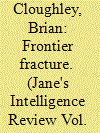

|
|
|
| 16 |
ID:
094646
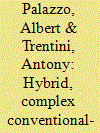

|
|
|
| 17 |
ID:
080660
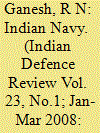

|
|
|
| 18 |
ID:
090172
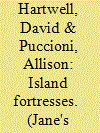

|
|
|
|
|
| Publication |
2009.
|
| Summary/Abstract |
Occupied and administered by Iran since 1971 but claimed by the United Arab Emirates, the tiny Persian Gulf island of Abu Musa, Greater Tunb and Lesser Tunb, occupy a vital postion at the entrance to the strait of Hormuz. The strait is one of the world's key strategic maritime choke points; it is just 54 km wide at its narrowest point, and 20 per cent of world crude oil shipments pass through it.
|
|
|
|
|
|
|
|
|
|
|
|
|
|
|
|
| 19 |
ID:
034591
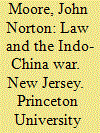

|
|
|
|
|
| Publication |
New Jersey, Princeton University Press, 1972.
|
| Description |
xxxiii, 794p.
|
| Standard Number |
0691030898
|
|
|
|
|
|
|
|
|
|
|
|
Copies: C:1/I:0,R:0,Q:0
Circulation
| Accession# | Call# | Current Location | Status | Policy | Location |
| 010888 | 341.62/MOO 010888 | Main | On Shelf | General | |
|
|
|
|
| 20 |
ID:
078262


|
|
|
|
|
| Publication |
2007.
|
| Summary/Abstract |
The US administration recently asserted that it was supporting liberal values through the deployment of military force to 'liberate' Iraq. This paper explores one aspect of the topical theme of liberalism and the use of force through a philosophical exercise concerning the means used to attain such ends. Drawing on the liberal political tradition, this paper puts forward an ideal type, a benchmark as it were, for militaries and their deployment by governments avowedly in pursuit of liberal agendas. This ideal type is constructed in two sections: operationalization and form. This paper therefore begins to provide a mechanism, some guidelines or talking points, for articulating and evaluating just how well liberal states may or may not be living up to their proclaimed lofty ideals in the very real world of military force and military forces at a time when a fundamental 'transformation' of defence is claimed to be a pressing priority
|
|
|
|
|
|
|
|
|
|
|
|
|
|
|
|